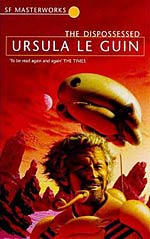
![]() Sable Aradia
Sable Aradia
12/16/2016
![]()
Read for the 12 Awards in 12 Months Reading Challenge, the Women of Genre Fiction Reading Challenge, the SF Masterworks Reading Challenge, and the Science Fiction Masterworks Book Club.
This is a delightfully subversive book. Believe it or not, I had never read it. The only thing I had ever read by Le Guin was A Wizard of Earthsea and that was many years ago, when I was a child. Those who have read it, know. Those who haven't... there's no real way to describe what the book is about without spoiling it for you, or giving you the completely wrong idea about it. But I'm going to try.
Shevek is a brilliant physicist who is driven to work on a theory that will change the universe. He was born into a society of anarchistic socialists, and the structure of that society, combined with elements of human nature, makes it difficult to publish and share his ideas. Elements of his society resist his desire to publish it and call him, and others like him, traitors. So he goes to another nearby world, of which his world is a moon, that is a society of hierarchical capitalists, to finish the work, against the wishes of his society, where the elite of that world seek to use him as a pawn in a game of politics.
Except that what the book is really about is the future of human society, and it's an exploration of whether human nature is about sharing or selfishness, egalitarianism or hierarchy, the group or the individual, revolution or conformity. It introduces the idea of "cellular function"; that is, the idea that a person contributes to society best by doing the thing they are naturally called to do. I find that this is very similar to the Thelemic idea of "True Will," only with what is perhaps a broader, more compassionate view.
Another reviewer on Goodreads has called Le Guin "the anti-Ayn Rand." Perhaps so. Through Le Guin's eyes we see the society of anarchistic socialist Anarres and capitalist hierarchy Urras compared and contrasted. She tells two parallel stories in alternating chapters, one of which takes place in the protagonist's past, the other his present. The first is the story of how the limitations and social pressures of Anarres' society convinced Shevek to go to Urras in an attempt to finish the work he is driven to do; the other is the story of how Shevek decides that he can't share the work in the society of Urras once it's completed, and what he chooses to do about that. It makes you ask whether it's laws or customs that actually rule society. She explores all these ideas through the eyes of an individual whose story made me laugh and cry. Le Guin is a good writer who is a pleasure to read.
Because it is an older piece of science fiction people are sometimes confused by the technology; for instance, getting news by telefax. But this society is actually in our far future, and obviously technological levels in different cultures have risen and fallen over the centuries. Some things are like our world, others are more advanced, and some lag. In this universe, where the exchange of information is either tightly controlled by bureaucracy and the elite, or is deliberately confused and allowed to run amok with outright lies and particular spins (hmm; wonder why that sounds familiar?) perhaps information exchange technologies are deliberately limited.
Ultimately it's a story of hope and a desire to find a better way for humanity. It makes you think and question what it is we're doing now. And that, after all, is arguably the purpose of science fiction. Everyone should read this book and ask themselves these questions, perhaps now more than ever.
https://dianemorrison.wordpress.com